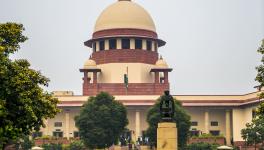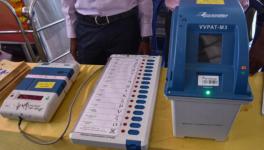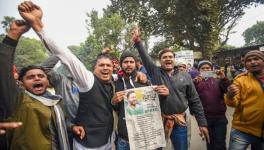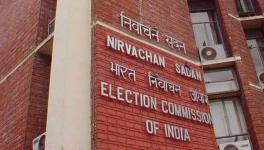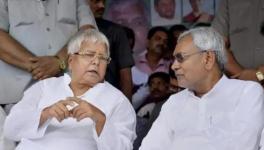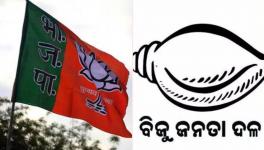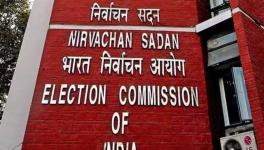Kenya's Disillusioned Youth Shun Election
Many buses park at the entrance of Kirigiti Stadium in Kiambu Town. The matatus, as they're known locally, transport people from surrounding towns to a rally of Raila Odinga, one of the two leading presidential candidates in Kenya's August 9 general election.
Vests, whistles and caps are handed to the crowd before they enter the stadium. Many will also receive money as a "small appreciation" for showing up.
One of the people who traveled here introduces himself as "John." He doesn't want to reveal his real name and risk the possibility of not receiving future handouts.
Raila Odinga has the support of current President Uhuru Kenyatta
"We were brought here today to cheer for Raila to show that he has big numbers. I'm a hustler and I have no money, so I thought it's better to come here instead of staying at home," John said. "At least I'll get something."
He was promised 1,000 Kenyan shillings (€8.25/$8.40) — quite some money in a country where 34% of people live on less than $1.90 a day, according to the World Bank.
Youth unemployment
John said he was frustrated with the current situation. He lost his job because of the pandemic, and he's been struggling to make ends meet ever since.
But he doesn't intend to vote for Odinga. Rather, he's a supporter of his main opponent, William Ruto, currently Kenya's deputy president.
"He assured us that as young people we will get jobs," John said.
About 5 million young Kenyans are out of work, according to census figures published in 2020.
Many Kenyans accuse lawmakers of greed and ignoring the people who voted for them
The situation for many Kenyans has been worsened by galloping food prices, exacerbated by the war in Ukraine, a devastating drought, the effects of the coronavirus pandemic and an unemployment crisis. So many are highly motivated to attend political rallies in exchange for cash handouts.
Peter Mwai Kamami, a national youth council delegate for central Kenya's Kiambu County, had asked John to come to Odinga's rally.
Kamami had received money from the campaign to mobilize 1,000 people. But it has been difficult to convince young people who tend to better relate to Ruto, he says.
"Ruto is young, energetic," Kamami said. "His 'hustler' narrative is more conversant with young people, as they're all hustling."
"There are people who survive on merely a dollar a day," Kamami said.
Some see low voter registration as a sign young people have lost faith in the electoral system
Youth vote registration plunges
Kamami said the biggest problems were unemployment and the government's failure to involve young people in their projects.
"Public participation is enshrined in our constitution, but we are not practicing it," he said. "The apathy is high."
That is also what the Independent Electoral and Boundaries Commission (IEBC) found: Only about 40% of registered voters in this election are youth — even though the under-35s account for three-fourths of Kenya's population of about 55 million.
The number has dropped by 5% since the last poll, according to the commission.
While Peter Mwai supports Odinga, he knows that most of the people he brought to cheer for him only care about the money they'll receive afterwards.
Analysts say many young people would not spend one or two hours queueing to vote
Bribing voters
"They don't believe in what they are shouting," Mwai said. "The volume from their voice boxes, depends on the amount of money that will go in their pockets."
Voter bribery is one of the most common electoral offenses, according to the National Crime Research Centre.
Over the past two decades, Kenya has witnessed some of the highest rates of vote buying in sub-Saharan Africa, according to Centre for the Study of Democratic Citizenship, McGill University.
Penalties for vote buying include fines of up to 2 million Kenyan shillings and/or a six-year jail sentence.
Kenyan Interior Minister Fred Matiang'i even told reporters that the banks were running short of 200 shilling notes "because politicians are bribing villagers."
Rallying voters
When Odinga arrived at Kirigiti stadium, there was still a lot of free space, but from the platform the venue looked full.
Odinga looked back into Kenya's history, reminding the crowds of a historic meeting held in this stadium by the first president, Jomo Kenyatta, before he was arrested by colonialists in 1952.
He only mentioned the youth once.
"This (vote) will be for the women and the youth. Kenya has four main challenges — ignorance, disease, poverty and corruption," Odinga told the crowd. "If we manage to nip these in the bud, we will move forward."
William Ruto is currently Kenya's deputy president
Two days later, Odinga's opponent, William Ruto, was touring through Kiambu county, the second-largest region by voter population after Nairobi county.
In the town of Thika, he stopped in the middle of the road and addressed a group of people from his limousine.
It was a smaller crowd — no stadium, no buses — but the people wore caps and vests and carried flags.
Ruto talked about the struggles of the people dealing with high food prices.
"You will be supported by accessing to the government's funds without having to pay interest, without being asked about security because we want to empower everyone's business," he said. "We will start from the bottom and go upwards. Bottom Up!"
'They lie, they give empty promises'
In a cafe in Kiambu town was Naomi Wanjiku Kibe, a 22-year-old electrical engineering student at Kiambu Institute of Science & Technology who sees no point in voting.
"They lie, they give empty promises, they only appear when they are seeking for votes," she told DW.
"After that, you'll never see them again until they come back to lie to you again," she said. "The deputy president says he will now change things that are not going well. If he wanted to do some change, he could have done it."
Not far from the cafe, a group of young men were warming up for a training session on a football pitch. Even though it's cold and humid, they give their all.
Alex Mugo, the chairman of Nyumba Kumi football club, watched them.
Sixty youngsters from the neighborhood train here. Besides that, Mugo raises money for their school fees and pays for sanitary pads for girls and provides food.
"Some can't even feed themselves when I talk of my group here. Most of these youth come to play without having taken breakfast," Mugo said.
Kenya's youth make up 70% of the population — a huge portion of the electorate
'Youth are becoming poorer and disillusioned day by day'
He and his team are hands-on and look for practical solutions to practical problems.
These young people need food, jobs, purpose, he said. That's what they get here. They have learnt to not expect anything from politicians.
"As years go by, the youths are becoming more frustrated with the government because they're always promising too much and nothing has happened," Mugo said.
"These youth are becoming poorer and poorer and disillusioned day by day and now they're having very little trust in these politicians," he said. "We feel a lot let down. I won't lie to you."
Mugo said he was doing the job that the government is supposed to do.
Out of the 19 boys training, only four say they will vote in this election.
Most of them have gone to rallies to receive the cash — like Peter Ngugi Njambi.
"I can't attend a rally if there's nothing on the table, because I need to eat," he said.
"I've attended quite a number of rallies, of almost all parties," he said. "I kept the campaign T-shirts but I don't wear them after the rally. That's what we normally do."
Edited by Keith Walker
Get the latest reports & analysis with people's perspective on Protests, movements & deep analytical videos, discussions of the current affairs in your Telegram app. Subscribe to NewsClick's Telegram channel & get Real-Time updates on stories, as they get published on our website.
















